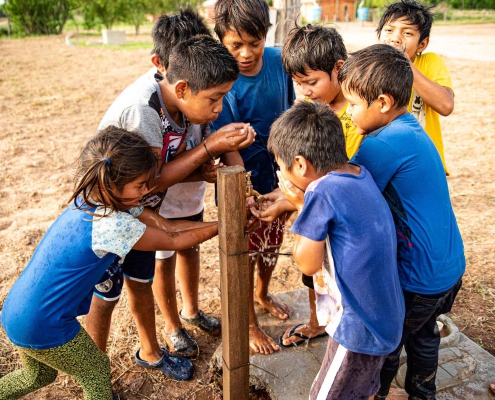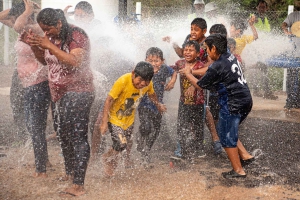OTHER PROGRAMMES ASSOCIATED WITH THE FUND

In addition to its own programmes, the Water Fund plays an important role in other programmes in Paraguay.
On the one hand, an ambitious programme of reimbursable cooperation is underway to co-fund, in conjunction with the IADB, the Drinking Water and Sanitation Project for Small Towns and Rural and Indigenous Communities.
This is a global programme in which FONPRODE is providing a loan of up to 20 million US dollars out of a total of 60 million US dollars. The operation is planned as a continuation of the fund programme PRY-011-M: Drinking Water and Sanitation for Rural and Indigenous Communities (PAYSRI), which ended in 2018, with the funding targeting rural areas. Among other activities, in 2021, work has started on the construction of water supply systems in 31 rural localities, various contracting processes have been initiated and sanitary sewage works are underway in three small towns (Fram, Capitán Miranda and Yhú), out of the eight planned.
On the other hand, the programme Drinking Water and Sanitation Project for the Metropolitan Area of Asunción – Lambaré Basin is still in the design and formalisation phase. This is a large multi-donor project with a 1.2-million-euro donation from the Water Fund[1] and a 10-million-euro donation from the European Union. In addition, FONPRODE will provide a credit of 60 million US dollars and the IADB will provide another credit of approximately 105 million US dollars. As of December 2021, approval by the Paraguayan Congress of the FONPRODE credit and the IADB credit is pending. The programme is in the design phase and will be developed over the next few years, benefiting around 450,000 people in the south-western part of the Metropolitan Area of Asunción. It is worth highlighting the multiplier effect produced through the Water Fund as an axis that generates trust and alliances between the different institutions involved in this programme. The Lambaré programme is therefore a flagship of the Spanish Cooperation’s commitment to achieve SDG 6 in Paraguay, given the alliances that have been generated and that have allowed its impact to be maximised in order to advance towards the achievement of the 2030 agenda.
Lastly, various technical cooperation projects have been launched under the LAIF Regional programme, which is managed by Spain through the Fund (see Section 4.1 Delegated Cooperation). These initiatives are related to adaptation to climate change and will help to design the Sanitation Plan for the Ypacaraí Lake Basin, to carry out the analysis of the Patino aquifer, to design the Bella Vista plant, and to establish a plan for the Pilcomayo basin.
[1] Through a Technical Cooperation executed by the IADB and titled Support for the implementation of reforms, institutional strengthening and the formulation of long-term investment plans for the water and sanitation sector in Paraguay.
COUNTRY CONTEXT

n the last years, Paraguay has gradually improved its level of access to basic water and, especially, sanitation services (now reaching 60% of the entire population). However, there are still significant gaps to achieve full coverage, especially in rural areas, where only 50% of the population has access to safe water (JMP, 2020).
Paraguay is one of the countries that have received the most support from the Cooperation Fund for Water and Sanitation (FCAS), with a contribution of 71 million euros in grants that have promoted programs worth more than 100 million euros.

